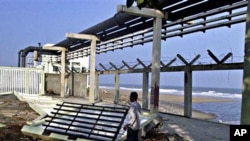The nuclear crisis in Japan has re-ignited a debate in India over nuclear energy. India is planning to spend billions of dollars to build new atomic reactors. Experts say the energy-hungry nation will press ahead with its plans to invest in nuclear energy.
India’s 20 existing nuclear reactors contribute a mere three percent to the country’s energy output. But that is set to change.
India plans to invest $175 billion in dozens of new atomic reactors over the coming years so that nuclear energy supplies about a quarter of the country’s energy needs by 2050.
Agreements have been signed with France and Russia to build new reactors. The United States is also expected to be a major supplier of atomic reactors in the future.
But as Japan battles to contain a crisis at its nuclear reactors, opposition parties in India have asked the government to review its ambitious plans to increase the use of nuclear energy. Anti-nuclear activists are calling for a freeze on further expansion pointing to potential risks from an accident.
The Indian government says it will not reconsider plans to expand nuclear power generation. It says it will, however, re-evaluate safety issues.
"There are lessons be learned,” said V. Raghuraman, a former energy adviser to the Confederation of India Industry. “That is what India will do. The question now will be one of re-examination and see whether the path on which we have been going ahead is providing the necessary safeguards and safety procedures are being incorporated, so they will be re-evaluated. So there may be some postponement, but no derailing of the process."
In particular, there is expected to be greater focus on potential safety hazards at a nuclear reactor to be built at Jaitapur, in western Maharashtra, by France. Billed as the world’s biggest reactor, it will generate about 10,000 megawatts of electricity. But some concerns have been raised because the site stands on an earthquake-prone zone.
Nuclear energy is important for India. Forty percent of its billion plus population lives without an electricity connection in their homes. The fast-growing economy indicates that demand from industries is increasing. And the country needs options to expensive oil imports.
Raghuraman says India needs to generate electricity from a variety of sources.
"India will have to go for multiple options,” he added. “They cannot have either-or situations. I don’t think nuclear will be wished away."
However, with images of Japan’s battle to contain radiation from its reactors being beamed worldwide, the debate over nuclear energy will continue.




